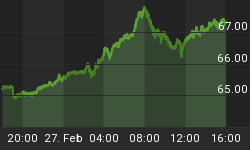Not a bad trick!
The government shuts down, and the Administration threatens default; the stock market drops a few percent, and then rallies to new highs. Then the shutdown ends, and the stock market rallies again because the shutdown ended.
I lose track of the mental gymnastics required to reconcile prices rising perpetually no matter what the news - or, what is worse, rising regardless of whether the news is "A" or "not A."
I saw an analyst report recently in which the writer argued that stocks were not overvalued per se; they were only one standard deviation above fair value. I don't disagree very much, quantitatively, with that view...it sounds about right. But the way it is expressed is somewhat misleading. We know that roughly two-thirds of a normal distribution is contained between +1 standard deviation and -1 standard deviation from the mean. This implies that only about one-third is outside of one standard deviation, and only half of that on the upside. In other words, a market which is "only one standard deviation above fair value" is in the 84th percentile or so of richness. Or, if we were to throw darts randomly at the distribution, about five of those darts would represent "down" and one would represent "up" from that level.
Now, whether or not we call that "expensive" or a "bubble" (I don't think it qualifies as a bubble) is mostly a linguistic argument rather than a financial argument. The financial/investing argument is whether it is smart to be invested in an 84th percentile market or not.
The answer isn't quite as clear as it seems because it depends on how rich the market is when you sell it. If you buy at the 84th percentile and later sell at the 84th percentile, then you've gained the growth in earnings and any dividends over that period. So it's not an automatic loser. Similarly, if you are holding a bad poker hand but push all your chips into the middle, you might win against someone else's hand in the event that theirs is even worse. But that doesn't mean it's a good move. In investing, as in poker, you win by making your biggest bets when odds are favorable, and avoiding bets when odds are adverse. And sometimes, that means you have to sit at the table for a long time waiting for good odds! So, whether stocks are "expensive" or not at the 84th percentile is to an important degree irrelevant to me. What is relevant is sizing my bet to reflect my chances of winning, which aren't very good right now.
Bonds are back in rally mode for now. The traditional seasonal pattern, which calls for a peak in yields on September 4th, has been strikingly useful this year (the high closing yield for the 10-year note was actually September 5th). But the main portion of that seasonal pattern is coming to an end. Yes, the Fed is continuing to buy bonds, but core inflation is now heading higher rather than lower as it was prior to last month, and we all realize that the can has only been kicked for a couple of months. Still, the VIX plunged on Wednesday and Thursday, so investors clearly don't anticipate any near-term volatility in markets. That seems really odd to me, since we are about to see the densest economic release calendar we have seen in many years. When I was an options trader, we scaled volatility by the density of economic releases (weighted by the importance of the release). I can't imagine wanting to sell volatility when we have the Retail Sales and Existing Home Sales reports on Monday, Employment Report and Chicago Fed on Tuesday, New Home Sales on Thursday, Durable Goods on Friday, and lots of corporate earnings besides; and the following week has PPI and CPI and the Chicago PM and ADP and ISM.
And meanwhile, in somewhat astonishing fashion today the dollar got clocked, falling to the lowest level since February. There are certainly some people in Washington scratching their heads on that one. All in all, I am not convinced by the VIX's brave face that it is the right time to sell such insurance. I would be a better buyer of volatility at these levels.
You can follow me @inflation_guy!
Enduring Investments is a registered investment adviser that specializes in solving inflation-related problems. Fill out the contact form at http://www.EnduringInvestments.com/contact and we will send you our latest Quarterly Inflation Outlook. And if you make sure to put your physical mailing address in the "comment" section of the contact form, we will also send you a copy of Michael Ashton's book "Maestro, My Ass!"















